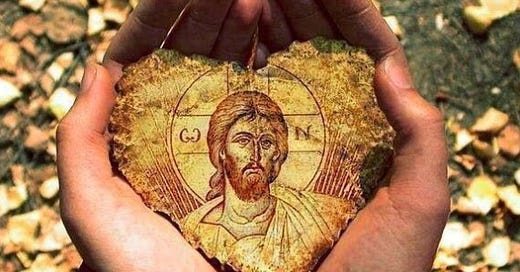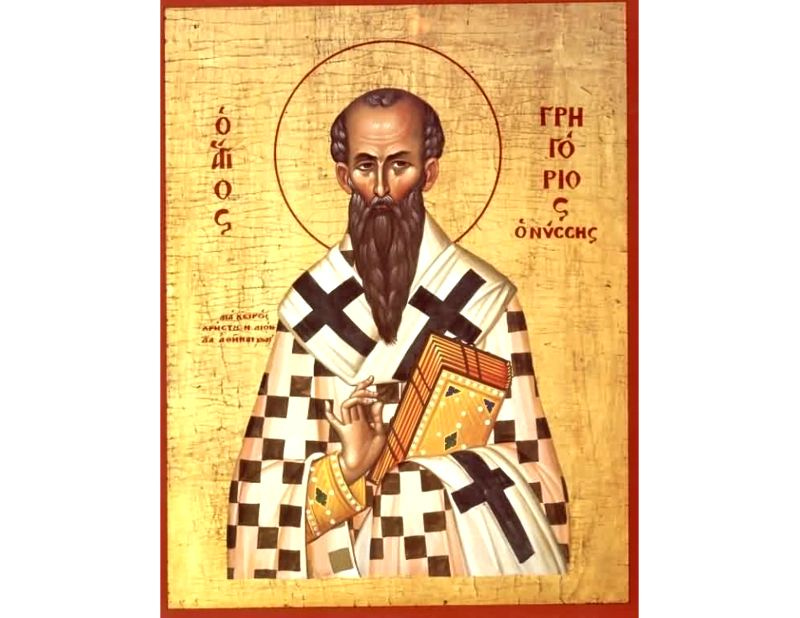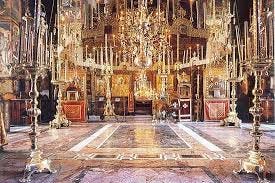"The soul that loves God has its rest in God and in God alone. In all the paths that men walking the world, they do not attain peace until they draw nigh to hope in God.”
St. Isaac the Syrian, Homily 56, 89
Daily Scripture Readings
Hebrews 7:18-25
Brethren, on the one hand, a former commandment is set aside because of its weakness and uselessness (for the law made nothing perfect); on the other hand, a better hope is introduced, through which we draw near to God. And it was not without an oath. Those who formerly became priests took their office without an oath, but this one was addressed with an oath, “The Lord has sworn and will not change his mind, ‘Thou art a priest forever.'” This makes Jesus the surety of a better covenant. The former priests were many in number, because they were prevented by death from continuing in office; but he holds his priesthood permanently, because he continues for ever. Consequently he is able for all time to save those who draw near to God through him, since he always lives to make intercession for them.
Luke 21: 37-22:8
At that time, Jesus was teaching in the temple, but at night he went out and lodged on the mount called Olivet. And early in the morning all the people came to him in the temple to hear him. Now the feast of Unleavened Bread drew near, which is called the Passover. And the chief priests and the scribes were seeking how to put him to death; for they feared the people. Then Satan entered into Judas called Iscariot, who was of the number of the twelve; he went away and conferred with the chief priests and officers how he might betray him to them. And they were glad, and engaged to give him money. So he agreed, and sought an opportunity to betray him to them in the absence of the multitude. Then came the day of Unleavened Bread, on which the passover lamb had to be sacrificed. So he sent Peter and John, saying, “Go and prepare the passover for us, that we may eat it.”
Saint Gregory, Bishop of Nyssa
Saint Gregory, Bishop of Nyssa, was a younger brother of Saint Basil the Great (January 1). His birth and upbringing came at a time when the Arian disputes were at their height. Having received an excellent education, he was at one time a teacher of rhetoric. In the year 372, he was consecrated by Saint Basil the Great as bishop of the city of Nyssa in Cappadocia.
Saint Gregory was an ardent advocate for Orthodoxy, and he fought against the Arian heresy with his brother Saint Basil. Gregory was persecuted by the Arians, by whom he was falsely accused of improper use of church property, and thereby deprived of his See and sent to Ancyra.
In the following year Saint Gregory was again deposed in absentia by a council of Arian bishops, but he continued to encourage his flock in Orthodoxy, wandering about from place to place. After the death of the emperor Valens (378), Saint Gregory was restored to his cathedra and was joyously received by his flock. His brother Saint Basil the Great died in 379.
Only with difficulty did Saint Gregory survive the loss of his brother and guide. He delivered a funeral oration for him, and completed Saint Basil’s study of the six days of Creation, the Hexaemeron. That same year Saint Gregory participated in the Council of Antioch against heretics who refused to recognize the perpetual virginity of the Mother of God. Others at the opposite extreme, who worshipped the Mother of God as being God Herself, were also denounced by the Council. He visited the churches of Arabia and Palestine, which were infected with the Arian heresy, to assert the Orthodox teaching about the Most Holy Theotokos. On his return journey Saint Gregory visited Jerusalem and the Holy Places.
In the year 381 Saint Gregory was one of the chief figures of the Second Ecumenical Council, convened at Constantinople against the heresy of Macedonius, who incorrectly taught about the Holy Spirit. At this Council, on the initiative of Saint Gregory, the Nicean Symbol of Faith (the Creed) was completed.
Together with the other bishops Saint Gregory affirmed Saint Gregory the Theologian as Archpastor of Constantinople.
In the year 383, Saint Gregory of Nyssa participated in a Council at Constantinople, where he preached a sermon on the divinity of the Son and the Holy Spirit. In 386, he was again at Constantinople, and he was asked to speak the funeral oration in memory of the empress Placilla. Again in 394 Saint Gregory was present in Constantinople at a local Council, convened to resolve church matters in Arabia.
Saint Gregory of Nyssa was a fiery defender of Orthodox dogmas and a zealous teacher of his flock, a kind and compassionate father to his spiritual children, and their intercessor before the courts. He was distinguished by his magnanimity, patience and love of peace.
Having reached old age, Saint Gregory of Nyssa died soon after the Council of Constantinople. Together with his great contemporaries, Saints Basil the Great and Gregory the Theologian, Saint Gregory of Nyssa had a significant influence on the Church life of his time. His sister, Saint Macrina, wrote to him: “You are renowned both in the cities, and gatherings of people, and throughout entire districts. Churches ask you for help.” Saint Gregory is known in history as one of the most profound Christian thinkers of the fourth century. Endowed with philosophical talent, he saw philosophy as a means for a deeper penetration into the authentic meaning of divine revelation.
Saint Gregory left behind many remarkable works of dogmatic character, as well as sermons and discourses. He has been called “the Father of Fathers.”
Spiritual Wisdom from St. Nectarios of Aegina
The church
The term CHURCH, according to the strict Orthodox view, has two meanings, one of them expressing its doctrinal and religious character, that is, its inner, peculiarly spiritual essence, and the other expressing its external character. Thus, according to the Orthodox confession, the Church is defined in a twofold manner: as a religious institution, and as a religious community (koinonia).
The definition of the CHURCH as a religious institution may be formulated thus: The Church is a divine religious institution of the New Testament, built by our Savior Jesus Christ through His incarnate Dispensation, established upon faith on the day of holy Pentecost by the descent of the All-Holy Spirit upon the holy Disciples and Apostles of the Savior Christ, whom He rendered instruments of Divine grace for the perpetuation of His work of redemption. In this institution is entrusted the totality of revealed truths; in it operates Divine grace through the Mysteries; in it are regenerated those, who with faith, approach Christ the Savior; in it has been preserved both the written and the unwritten Apostolic teaching and tradition.
The definition of the CHURCH as a religious community may be formulated thus: The CHURCH is a society of men united in the unity of the Spirit, in the bond of peace.
The right view of the CHURCH is that the CHURCH is distinguished into the Militant and the Triumphant; and that it is Militant so long as it struggles against wickedness for the prevalence of the good, the Triumphant in the heavens, where there dwells the choir of the Righteous, who struggled and were made perfect in the faith in God and in virtue.
This week’s calendar reminders:
Monday 1/6: Holy Theophany Festal Divine Liturgy 9:15 am
Tuesday 1/7: no services or events
Wednesday 1/8: no services or events
Thursday 1/9: Matins 8:30 am
Friday 1/10: Matins 8:30 am
Saturday 1/11: Catechumen Class 4:30pm; Great Vespers 6 pm
Sunday 1/12: Divine Liturgy 9:15am











